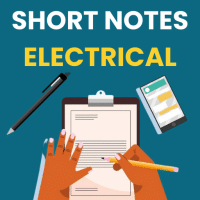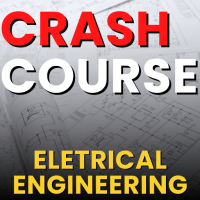Electrical Engineering (EE) Exam > Electrical Engineering (EE) Questions > Electrical time-constant of an armature-contr...
Start Learning for Free
Electrical time-constant of an armature-controlled dc servomotor is :
- a)Equal to mechanical time-constant
- b)Smaller than mechanical time-constant
- c)Larger than mechanical time-constant
- d)Not related to mechanical time-constant
Correct answer is option 'B'. Can you explain this answer?
Verified Answer
Electrical time-constant of an armature-controlled dc servomotor is :a...
Explanation: Electrical time constant is smaller than the mechanical time constant and hence the delay in the mechanical systems is more than the electrical systems.
Most Upvoted Answer
Electrical time-constant of an armature-controlled dc servomotor is :a...
Electrical Time-Constant of an Armature-Controlled DC Servomotor
The electrical time-constant of an armature-controlled DC servomotor refers to the time it takes for the motor's armature winding to reach approximately 63.2% of its final value when subjected to a step change in voltage. This time-constant is an important parameter that characterizes the dynamic response of the motor.
Relationship with Mechanical Time-Constant
The mechanical time-constant of a DC servomotor, on the other hand, refers to the time it takes for the motor's mechanical system to reach approximately 63.2% of its final value when subjected to a step change in torque. It characterizes the inertia and mechanical damping of the motor.
The electrical and mechanical time-constants are related because the armature current, which is directly affected by the electrical time-constant, generates the torque that drives the mechanical system. Therefore, the electrical time-constant influences the speed at which the mechanical system responds to changes in the armature current.
Explanation of the Correct Answer
The correct answer, option 'B', states that the electrical time-constant of an armature-controlled DC servomotor is smaller than the mechanical time-constant. This is generally true for most DC servomotors, and here's why:
1. Electrical Processes: The armature-controlled DC servomotor operates based on electrical processes. The electrical time-constant is primarily determined by the resistance and inductance of the armature winding. These electrical components have relatively fast response times compared to the mechanical system.
2. Mechanical Processes: The mechanical processes in a DC servomotor, such as the inertia and damping, are inherently slower compared to the electrical processes. The mechanical time-constant depends on the moment of inertia of the motor's rotor, the frictional forces, and the mechanical load connected to the motor.
3. Armature Inductance: The inductance of the armature winding introduces a delay in the response of the motor's armature current to changes in the applied voltage. This delay contributes to the smaller electrical time-constant compared to the mechanical time-constant.
4. Feedback Control: In armature-controlled DC servomotors, a feedback control system is typically employed to regulate the motor's speed or position. This control system further influences the time-constants by adjusting the voltage applied to the motor based on the feedback signal. The feedback control loop can be designed to compensate for the differences in time-constants and improve overall performance.
In summary, the electrical time-constant of an armature-controlled DC servomotor is generally smaller than the mechanical time-constant due to the faster response of the electrical components compared to the mechanical system. This difference in time-constants is important to consider when designing and analyzing the dynamic behavior of DC servomotors.
The electrical time-constant of an armature-controlled DC servomotor refers to the time it takes for the motor's armature winding to reach approximately 63.2% of its final value when subjected to a step change in voltage. This time-constant is an important parameter that characterizes the dynamic response of the motor.
Relationship with Mechanical Time-Constant
The mechanical time-constant of a DC servomotor, on the other hand, refers to the time it takes for the motor's mechanical system to reach approximately 63.2% of its final value when subjected to a step change in torque. It characterizes the inertia and mechanical damping of the motor.
The electrical and mechanical time-constants are related because the armature current, which is directly affected by the electrical time-constant, generates the torque that drives the mechanical system. Therefore, the electrical time-constant influences the speed at which the mechanical system responds to changes in the armature current.
Explanation of the Correct Answer
The correct answer, option 'B', states that the electrical time-constant of an armature-controlled DC servomotor is smaller than the mechanical time-constant. This is generally true for most DC servomotors, and here's why:
1. Electrical Processes: The armature-controlled DC servomotor operates based on electrical processes. The electrical time-constant is primarily determined by the resistance and inductance of the armature winding. These electrical components have relatively fast response times compared to the mechanical system.
2. Mechanical Processes: The mechanical processes in a DC servomotor, such as the inertia and damping, are inherently slower compared to the electrical processes. The mechanical time-constant depends on the moment of inertia of the motor's rotor, the frictional forces, and the mechanical load connected to the motor.
3. Armature Inductance: The inductance of the armature winding introduces a delay in the response of the motor's armature current to changes in the applied voltage. This delay contributes to the smaller electrical time-constant compared to the mechanical time-constant.
4. Feedback Control: In armature-controlled DC servomotors, a feedback control system is typically employed to regulate the motor's speed or position. This control system further influences the time-constants by adjusting the voltage applied to the motor based on the feedback signal. The feedback control loop can be designed to compensate for the differences in time-constants and improve overall performance.
In summary, the electrical time-constant of an armature-controlled DC servomotor is generally smaller than the mechanical time-constant due to the faster response of the electrical components compared to the mechanical system. This difference in time-constants is important to consider when designing and analyzing the dynamic behavior of DC servomotors.
Free Test
FREE
| Start Free Test |
Community Answer
Electrical time-constant of an armature-controlled dc servomotor is :a...
Smaller than mechanical time constant
nrmature control DC server motor is a single time constant feedback control mechanism as la =0
nrmature control DC server motor is a single time constant feedback control mechanism as la =0

|
Explore Courses for Electrical Engineering (EE) exam
|

|
Question Description
Electrical time-constant of an armature-controlled dc servomotor is :a)Equal to mechanical time-constantb)Smaller than mechanical time-constantc)Larger than mechanical time-constantd)Not related to mechanical time-constantCorrect answer is option 'B'. Can you explain this answer? for Electrical Engineering (EE) 2025 is part of Electrical Engineering (EE) preparation. The Question and answers have been prepared according to the Electrical Engineering (EE) exam syllabus. Information about Electrical time-constant of an armature-controlled dc servomotor is :a)Equal to mechanical time-constantb)Smaller than mechanical time-constantc)Larger than mechanical time-constantd)Not related to mechanical time-constantCorrect answer is option 'B'. Can you explain this answer? covers all topics & solutions for Electrical Engineering (EE) 2025 Exam. Find important definitions, questions, meanings, examples, exercises and tests below for Electrical time-constant of an armature-controlled dc servomotor is :a)Equal to mechanical time-constantb)Smaller than mechanical time-constantc)Larger than mechanical time-constantd)Not related to mechanical time-constantCorrect answer is option 'B'. Can you explain this answer?.
Electrical time-constant of an armature-controlled dc servomotor is :a)Equal to mechanical time-constantb)Smaller than mechanical time-constantc)Larger than mechanical time-constantd)Not related to mechanical time-constantCorrect answer is option 'B'. Can you explain this answer? for Electrical Engineering (EE) 2025 is part of Electrical Engineering (EE) preparation. The Question and answers have been prepared according to the Electrical Engineering (EE) exam syllabus. Information about Electrical time-constant of an armature-controlled dc servomotor is :a)Equal to mechanical time-constantb)Smaller than mechanical time-constantc)Larger than mechanical time-constantd)Not related to mechanical time-constantCorrect answer is option 'B'. Can you explain this answer? covers all topics & solutions for Electrical Engineering (EE) 2025 Exam. Find important definitions, questions, meanings, examples, exercises and tests below for Electrical time-constant of an armature-controlled dc servomotor is :a)Equal to mechanical time-constantb)Smaller than mechanical time-constantc)Larger than mechanical time-constantd)Not related to mechanical time-constantCorrect answer is option 'B'. Can you explain this answer?.
Solutions for Electrical time-constant of an armature-controlled dc servomotor is :a)Equal to mechanical time-constantb)Smaller than mechanical time-constantc)Larger than mechanical time-constantd)Not related to mechanical time-constantCorrect answer is option 'B'. Can you explain this answer? in English & in Hindi are available as part of our courses for Electrical Engineering (EE).
Download more important topics, notes, lectures and mock test series for Electrical Engineering (EE) Exam by signing up for free.
Here you can find the meaning of Electrical time-constant of an armature-controlled dc servomotor is :a)Equal to mechanical time-constantb)Smaller than mechanical time-constantc)Larger than mechanical time-constantd)Not related to mechanical time-constantCorrect answer is option 'B'. Can you explain this answer? defined & explained in the simplest way possible. Besides giving the explanation of
Electrical time-constant of an armature-controlled dc servomotor is :a)Equal to mechanical time-constantb)Smaller than mechanical time-constantc)Larger than mechanical time-constantd)Not related to mechanical time-constantCorrect answer is option 'B'. Can you explain this answer?, a detailed solution for Electrical time-constant of an armature-controlled dc servomotor is :a)Equal to mechanical time-constantb)Smaller than mechanical time-constantc)Larger than mechanical time-constantd)Not related to mechanical time-constantCorrect answer is option 'B'. Can you explain this answer? has been provided alongside types of Electrical time-constant of an armature-controlled dc servomotor is :a)Equal to mechanical time-constantb)Smaller than mechanical time-constantc)Larger than mechanical time-constantd)Not related to mechanical time-constantCorrect answer is option 'B'. Can you explain this answer? theory, EduRev gives you an
ample number of questions to practice Electrical time-constant of an armature-controlled dc servomotor is :a)Equal to mechanical time-constantb)Smaller than mechanical time-constantc)Larger than mechanical time-constantd)Not related to mechanical time-constantCorrect answer is option 'B'. Can you explain this answer? tests, examples and also practice Electrical Engineering (EE) tests.

|
Explore Courses for Electrical Engineering (EE) exam
|

|
Signup for Free!
Signup to see your scores go up within 7 days! Learn & Practice with 1000+ FREE Notes, Videos & Tests.























